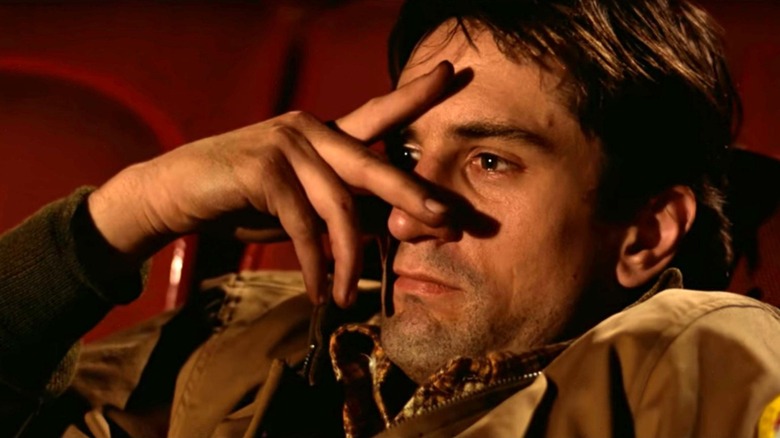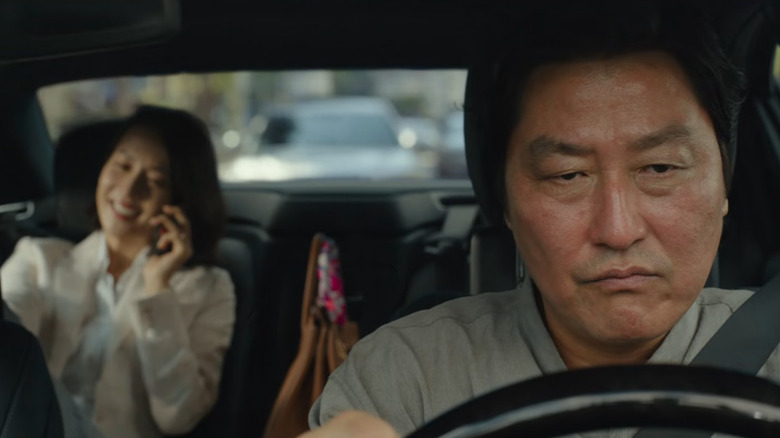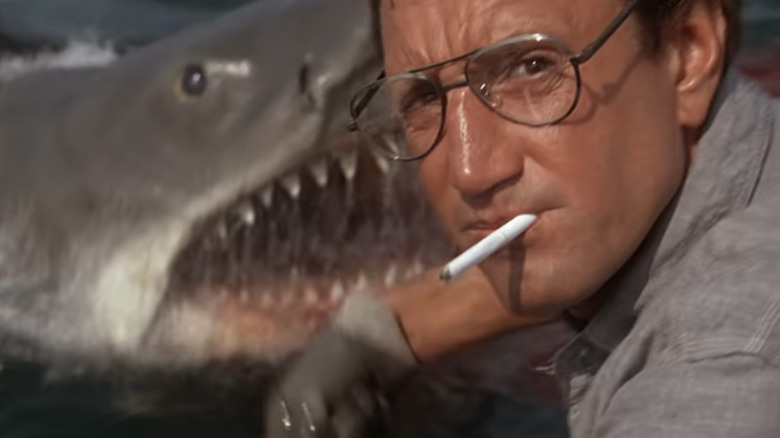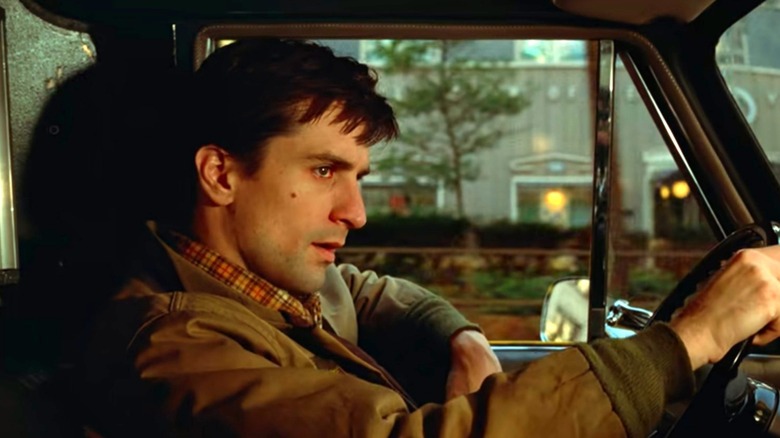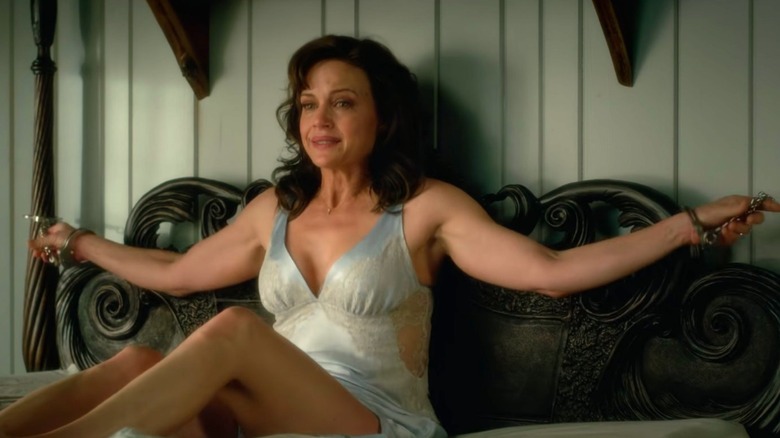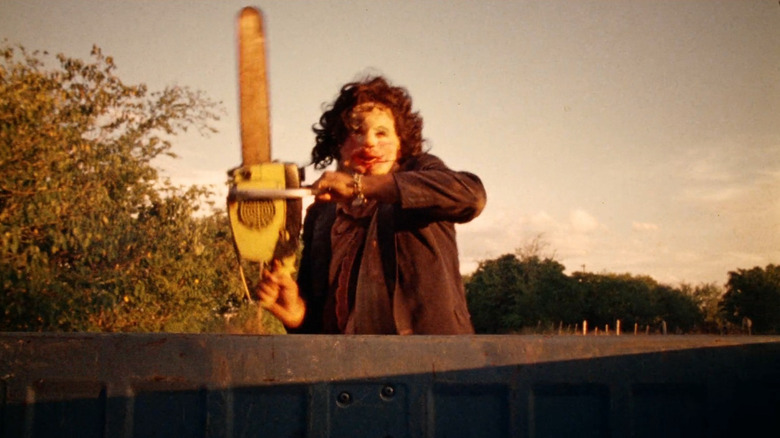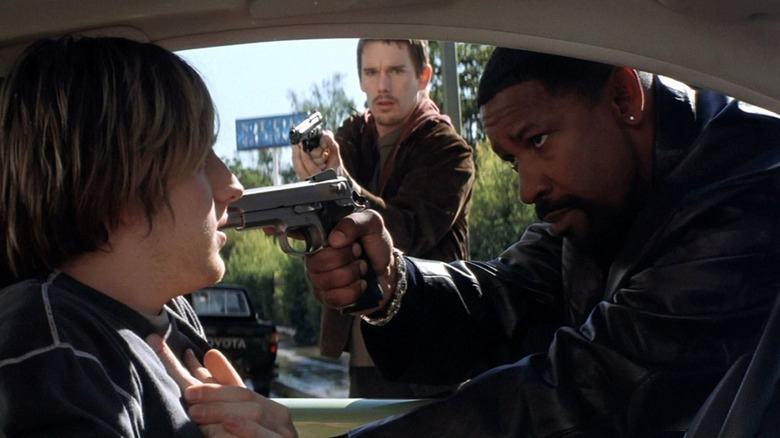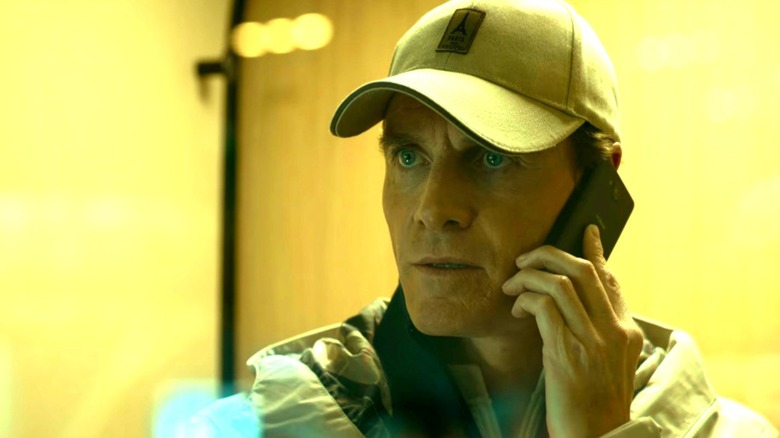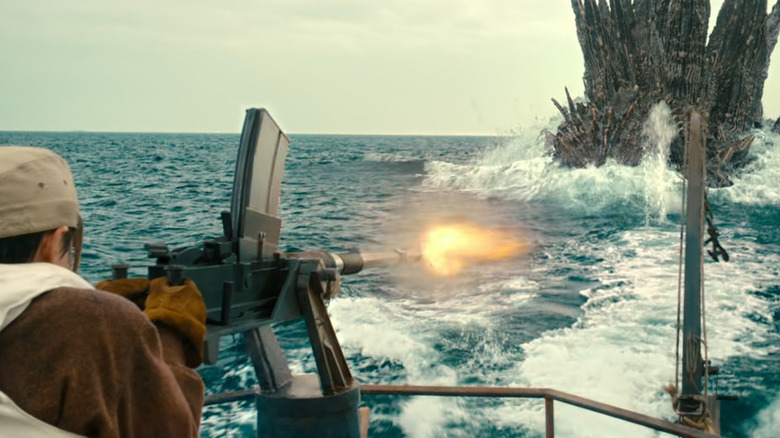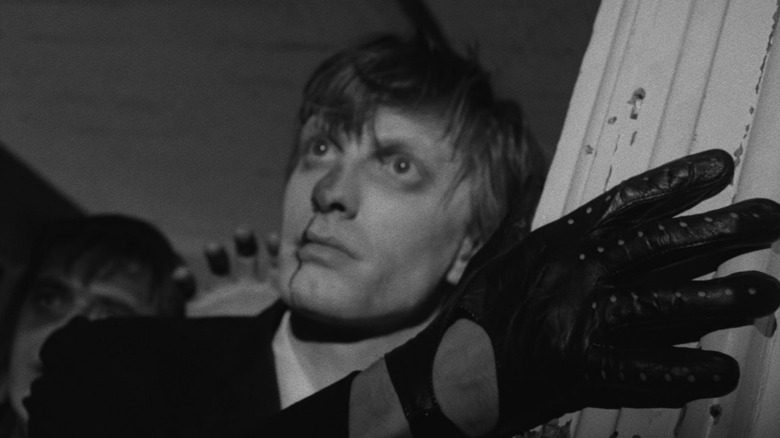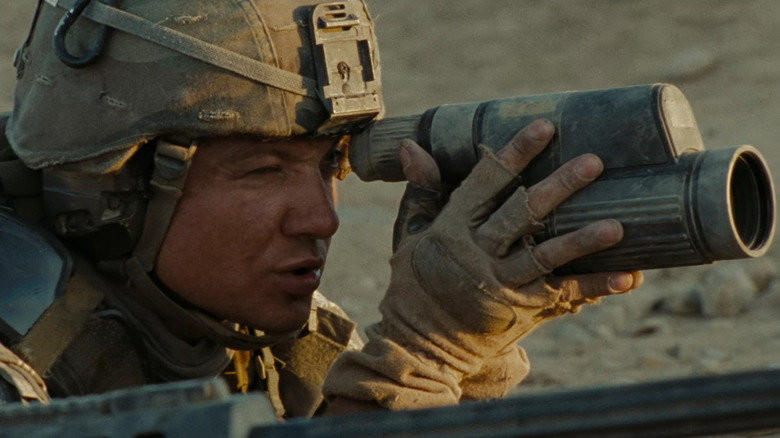The 10 Best Suspense Movies On Netflix Right Now
Nothing puts viewers on the edge of their seats quite like a great suspense movie. Dramas can make you think and comedies can make you laugh, but suspense movies can make you feel like you are sailing a boat in shark-infested waters, or dodging an elite assassin's bullet. Ominous, exciting, and always unpredictable, suspense films on streaming services offer heightened stakes and unique thrills within the comfort of your own home — no shark-infested waters required.
Suspense can be found lurking in every shadowy corner of Hollywood, from beloved summer blockbusters and epic creature features to groundbreaking independent films. So if you are scrolling through Netflix with no idea which suspenseful shocker to watch next, have no fear, we've handpicked the best. Turn down the lights and hold on tight — these are the 10 best suspense films streaming on Netflix.
Parasite
From the visionary mind of director Bong Joon Ho springs "Parasite," the universally-acclaimed 2019 South Korean film that knocked down a major Hollywood barrier as the first non-English language film to win the Academy Award for best picture. Switching effortlessly between suspenseful domestic thriller and furiously funny social satire, "Parasite" is a genre-defying masterpiece, one that could be described as a haunted house film — but one without any ghosts.
The Kims are a hardworking, poor family of four living in a basement apartment in Seoul. When son Ki-woo (Choi Woo-shik) becomes a tutor for the upper class Park family, the Kims conspire to frame and replace their household staff, securing comfortable jobs for themselves in the Parks' extravagantly wealthy home under false identities.
This ingenious premise would be enough for most films, but Bong's 21st century take on class warfare is only getting started. The plot to "Parasite" doesn't twist so much as pull tighter and tighter until it finally snaps, and Kim family patriarch Ki-taek (Song Kang-ho) commits a startling act of violence. "Parasite" is a deeply metaphorical, high-concept thriller that rewards multiple viewings from sharp-eyed audience members. Just don't look in the basement.
Jaws
Called "one of the most effective thrillers ever made" by the late, great film critic Roger Ebert, "Jaws" turns a beautiful day at the beach into a living nightmare. It's summertime on Amity Island, and an enormous great white shark has a taste for human prey, as a night swimmer tragically learns in the film's infamous opening sequence.
After her bloody remains wash ashore, police chief Martin Brody (Roy Scheider) reluctantly allows the beaches to stay open, and the shark strikes again, killing a young boy. Brody teams up with young oceanographer Matt Hooper (Richard Dreyfuss) and flint-eyed shark hunter Quint (Robert Shaw) to set sail on the ocean and kill the underwater menace, but as Brody soon realizes, they are "gonna need a bigger boat."
"Jaws" was released in 1975 and was the first blockbuster hit for the now-legendary director Steven Spielberg. Notably, the deadly shark is unseen for most of the film, thanks to a malfunctioning prop — its presence is instead suggested by underwater point-of-view shots and a pulsating, relentless main theme that has become synonymous with suspense. (Composer and frequent Spielberg collaborator John Williams won an Academy Award and a Golden Globe for this famous film score.) "Jaws" inspired three sequels — none directed by Spielberg — with diminishing returns, but time has done nothing to diminish one of Hollywood's biggest crowd-pleasers. Today, "Jaws" is considered not just a great thriller, but one of the best films ever made.
Taxi Driver
Travis Bickle is a lonely, lonely man. Brought to searing life by Robert De Niro, Travis is the definitive Martin Scorsese protagonist, an outsider searching for meaning in the neon-stained streets of New York City. But no matter where he looks, this disturbed and antisocial taxi cab driver can see only depravity and violence.
Written by Paul Schrader and directed by Scorsese, 1976's "Taxi Driver" is an intense neo-noir about Travis's final, desperate grabs at rejoining a society that seems to have no place for him. He romanticizes Betsy (Cybill Shepherd), the beautiful blonde working on a senator's presidential campaign, but when she flees an ill-advised date at an adult movie theater, he contemplates assassinating her boss instead. He finally finds purpose in the form of Iris (Jodie Foster), a child sex worker under the thrall of a pimp named Sport (Harvey Keitel). If Travis can save her, maybe he can save himself and quell his violent impulses. Maybe.
Now considered a classic, "Taxi Driver" has attracted controversy, both for the casting of the underage Foster and for allegedly inspiring real-life violence with its explosive, graphic third act. New Yorker film critic Pauline Kael rejected the idea of "Taxi Driver" glorifying its protagonist, however, arguing in a contemporary review that the film "doesn't operate in moral judgment of what Travis does." Instead, "It makes us understand the psychic discharge of the quiet boys who go berserk."
Gerald's Game
Written by master of horror Stephen King, the 1992 novel "Gerald's Game" was once thought to be unfilmable – virtually the entire story follows a lone woman handcuffed to a bed for several days after a sex game goes wrong. Director Mike Flanagan takes that challenging premise and spins it into a nerve-shredding thriller.
The 2017 film begins with Gerald (Bruce Greenwood) and Jessie Burlingame (Carla Gugino) vacationing at a secluded lake house in an attempt to revive their troubled marriage. Engaging in a sexual roleplay fantasy, Gerald handcuffs Jessie's wrists to the bedposts — only to immediately suffer a fatal heart attack. Unable to move, eat, or summon help, Jessie's mind begins to unravel as she hallucinates visions of her younger self (Chiara Aurelia), her dead husband, and finally, a ghoulish "Moonlight Man" (Carel Struycken) who may actually be real. Jessie will have to do the unthinkable if she is going to survive "Gerald's Game."
Anchored by Carla Gugino's powerful lead performance, "Gerald's Game" never flinches from Jessie's plight, whether she's remembering the childhood sexual abuse committed by her father (Henry Thomas) or struggling to retrieve a life-sustaining glass of water from a shelf above the bed. "Gerald's Game" is a nail-biter right to the very end.
If you or anyone you know has been a victim of sexual assault, help is available. Visit the Rape, Abuse & Incest National Network website or contact RAINN's National Helpline at 1-800-656-HOPE (4673).
The Texas Chain Saw Massacre (1974)
One of three iconic horror films inspired by notorious serial killer Ed Gein, "The Texas Chain Saw Massacre" at first seems too loud and too violent to make this list. (After all, the words "Chain Saw" and "Massacre" are right there in the title.) But among the film's many shocks is a relative lack of blood and gore — instead, it is a masterpiece of mounting, unstoppable dread.
When news breaks of a grave robbery in a small Texas town, Sally Hardesty (Marilyn Burns) and her friends take a road trip to make sure her grandfather's grave is undisturbed. Low on gas and disturbed by an encounter with a creepy hitchhiker (Edwin Neal), the group stops by a seemingly abandoned house, only to fall prey to the chainsaw-wielding Leatherface (Gunnar Hansen) and his cannibalistic family.
Directed by Tobe Hooper, "The Texas Chain Saw Massacre" unsettles viewers with its raw performances (particularly from Burns) and documentary-style realism. Moreover, it proved exploitation films could be art — the Museum of Modern Art added the film to its permanent collection in 1974, the year it was released. One of the most influential horror films of all time, "The Texas Chain Saw Massacre" spawned a flesh-eating franchise with multiple sequels and reboots, including a critically-panned 2022 Netflix sequel that acts as a direct follow-up to Hooper's film. Unfortunately, none of these Texas massacres can hold a chainsaw to the original.
Training Day
In "Training Day," Denzel Washington gives an Academy Award-winning performance as a charismatic and corrupt narcotics officer operating out of the seething heart of Los Angeles. Released in 2001, Antoine Fuqua's film – based on real events – spans a very long day in the life of LAPD officer Jake Hoyt (Ethan Hawke, also Oscar-nominated).
Married with a newborn at home, the ambitious Jake is assigned to work with Detective Alonzo Harris (Washington) to see if he has what it takes to join his elite narcotics squad. Unfortunately, Alonzo's the kind of crooked cop whose idea of training includes making Jake smoke PCP-laced marijuana at gunpoint — and that's just the beginning. As Jake is pulled deeper and deeper into Alonzo's world, he discovers that the disgraced detective is part of a wider web of corruption.
An adrenaline-fueled crime drama, "Training Day" features a stacked supporting cast (including Scott Glenn, Tom Berenger, Snoop Dog, and Eva Mendes as Alonzo's unlucky mistress) and plenty of gunfire, but it belongs completely to Denzel Washington. He is effortlessly mesmerizing as the volatile Alonzo, telling Jake, "To protect the sheep you gotta catch the wolf, and it takes a wolf to catch a wolf." By the end of the film, Alonzo will know if Jake is a sheep, or a wolf.
If you or anyone you know needs help with addiction issues, help is available. Visit the Substance Abuse and Mental Health Services Administration website or contact SAMHSA's National Helpline at 1-800-662-HELP (4357).
The Killer (2023)
David Fincher knows how to make a suspenseful movie. The director of "Fight Club," "Se7en," and "Zodiac," Fincher is recognized for his atmospheric, meticulously-designed thrillers, and his 2023 action film "The Killer" (which Looper called "sharp and darkly comic") is no exception.
Michael Fassbender plays the nameless killer of the title, a man who prides himself on his cold, logistical approach to murder, but still sneaks in a little yoga before a mission and religiously listens to The Smiths. The Killer's detached demeanor fails him, however, when a pair of assassins brutalize his girlfriend, putting her in the hospital and triggering a one-man international mission of revenge.
An excellent entry point into Fincher's filmography, "The Killer" is uncannily convincing in its depiction of the life of its contract killer. Even as Fassbender's implacable hitman puts the "cold" back into "stone cold killer," he is a richly-observed character, from the unusual "mercy" he bestows on his boss's doomed employee to his hilariously specific McDonalds breakfast order. "The Killer" is a sly, stylish action film that's as explosive as a Molotov cocktail.
Godzilla Minus One
What is the defining quality of a suspense movie that separates it from all other genres? Perhaps it is simply that in a suspense movie, the audience knows more than the characters do — and no one knows what's about to happen on screen more than people watching a Godzilla movie.
Disgraced kamikaze pilot Kōichi Shikishima (Ryunosuke Kamiki), the hero of "Godzilla Minus One," certainly doesn't know that he's in a Godzilla movie. In the waning days of World War II, Shikishima escapes his suicide mission only to nearly lose his life when a dinosaur-like monster attacks his garrison. Returning to the firebombed remains of Tokyo, Shikishima rebuilds his life with the kindly Noriko (Minami Hamabe) and the orphan Akiko (Sae Nagatani). But then the mutated monster — now known as Godzilla — re-emerges from the ocean, with catastrophic results.
Written and directed by Takashi Yamazaki, "Godzilla Minus One" is a surprisingly emotional meditation on grief, duty, and heroism, and a more worthy successor to the long-running franchise's anti-war, anti-nuke origins than any of its American cousins from Legendary Pictures. Praising "Godzilla Minus One" as one of the best international films of 2023, Deadline's Pete Hammond marveled, "This is a Godzilla for the ages, a Godzilla art film."
Godzilla fans take note: Netflix is streaming two versions of the film — the hit theatrical cut, and "Godzilla-1.0/C," a specially-retouched black-and-white version of "Godzilla Minus One" that strengthens its thematic connections to the original 1954 "Godzilla."
Night of the Living Dead (1968)
Night falls in a lonely Pennsylvania cemetery. Barbra (Judith O'Dea) and her brother Johnny (Russell W. Streiner) place a wreath on their father's grave, but Barbra is unnerved by their eerie surroundings. Johnny sees a pale, disheveled man stumbling towards them. Smirking, he teases his sister: "They're coming to get you, Barbra!" And with those words, horror cinema is changed forever.
1968's "Night of the Living Dead" is a landmark in independent filmmaking and single-handedly invented the zombie horror genre as we know it today — though the word "zombie" is never uttered onscreen. Considering the film's tremendous impact, the story is shockingly simple: As the recently-dead reanimate into flesh-eating ghouls, Barbra and a small group of survivors barricade themselves inside a farmhouse. But as tensions mount, the survivors prove to be just as dangerous to each other as the mindless horde outside.
The first film by celebrated director George A. Romero, "Night of the Living Dead" is a politically-charged, taboo-breaking shock to the system. Actor Duane Jones gives an unforgettable performance as Ben, the heroic and embattled leader of the group. Significantly, "Night of the Living Dead" was one of the few films in the 1960s to feature a Black lead among a majority white cast. Now recognized as the grandfather of the zombie apocalypse, Romero directed five follow-ups to "Night of the Living Dead," with the last, "Survival of the Dead," released in 2009. Decades later, Romero's zombies are still coming to get us.
The Hurt Locker
A film of unrelenting pressure and probing psychological insight, "The Hurt Locker" is one of the definitive war movies of the 21st century. Released in 2009, "The Hurt Locker" depicts the early years of the Iraq War through the eyes of U.S. soldiers in a bomb disposal unit. After a dramatic prologue establishes the deadly stakes of their job, we meet Staff Seargent William James (Jeremy Renner, in a star-making turn), who is exceptionally talented at deactivating bombs but also exceptionally reckless.
James clashes with the more even-tempered Sergeant J.T. Sanborn (Anthony Mackie) and Specialist Owen Eldridge (Brian Geraghty), who is still emotionally shaken by the death of their previous team leader. The film follows these three men throughout several life-or-death missions, as James' unorthodox methods — and his adrenaline-addicted attitude — jeopardize not just himself, but also the lives of innocent Iraqi civilians and his fellow soldiers.
Directed by Kathryn Bigelow, "The Hurt Locker" was inspired by the real-life experiences of its screenwriter, Mark Boal, a journalist who in 2004 was embedded with an American bomb disposal team. A shaky, explosive film that keeps audiences on the edge of their seats, "The Hurt Locker" won the 2010 Academy Award for best picture. It also does the rare work of turning a stock war movie archetype — the maverick soldier who doesn't play by the rules — into a real person with real motivations. But what does such a person say about war, and who wages it?
